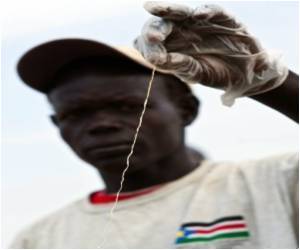
The research, performed by John Worthington, a post-doctoral research associate within the University of Manchester's Immunology Group, studied mice lacking immune cells and feeding hormones during a Trichinella spiralis worm infection. The T-helper cells of the mouse's immune system responded by increasing levels of the feeding hormone cholecystokinin to cause a reduction in weight and fat deposits. This reduced the levels of the fat produced hormone leptin, which can influence the immune response.
To see if this reduction in leptin was beneficial, the researchers restored leptin levels during worm infection and saw that these treated mice did not make the correct immune response to the parasite resulting in a delayed worm expulsion. This research was confined to mice so any relevance to humans is not clear. However intestinal parasitic worm infections are extremely common throughout the animal kingdom including mice and the authors conclude that the study "provides novel insights into how the immune system interacts with feeding pathways during intestinal inflammation and may help us design new strategies for helping people with parasitic infections of the gut".
Source-Eurekalert















